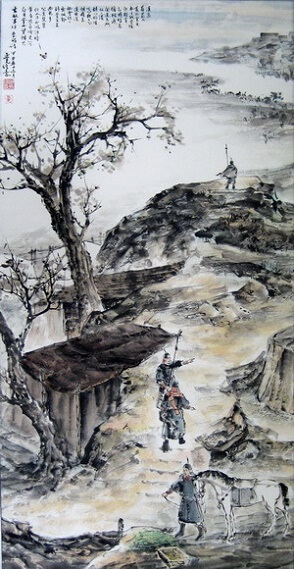An Old War-Song
- Poetry of Li Qi

Through the bright day up the mountain, we scan the sky for a war-torch;
At yellow dusk we water our horses in the boundaryriver;
And when the throb of watch-drums hangs in the sandy wind,
We hear the guitar of the Chinese Princess telling her endless woe....
Three thousand miles without a town, nothing but camps,
Till the heavy sky joins the wide desert in snow.
With their plaintive calls, barbarian wildgeese fly from night to night,
And children of the Tartars have many tears to shed;
But we hear that the Jade Pass is still under siege,
And soon we stake our lives upon our light warchariots.
Each year we bury in the desert bones unnumbered,
Yet we only watch for grape-vines coming into China.
Folk-song-styled-verse
This Tang dynasty poem by Li Qi adopts a soldier's perspective to depict the harsh realities of frontier warfare, exposing war's cruelty and garrison troops' desolation. While most Tang frontier poetry glorified military heroism, this work's anti-war stance makes it uniquely valuable, offering implicit criticism of imperial militarism.
白日登山望烽火,黄昏饮马傍交河。
行人刁斗风沙暗,公主琵琶幽怨多。
野云万里无城郭,雨雪纷纷连大漠。
胡雁哀鸣夜夜飞,胡儿眼泪双双落。
闻道玉门犹被遮,应将性命逐轻车。
年年战骨埋荒外,空见蒲桃入汉家。
- Why Chinese poems is so special?
- The most distinctive features of Chinese poetry are: concision- many poems are only four lines, and few are much longer than eight; ambiguity- number, tense and parts of speech are often undetermined, creating particularly rich interpretative possibilities; and structure- most poems follow quite strict formal patterns which have beauty in themselves as well as highlighting meaningful contrasts.
- How to read a Chinese poem?
- Like an English poem, but more so. Everything is there for a reason, so try to find that reason. Think about all the possible connotations, and be aware of the different possibilities of number and tense. Look for contrasts: within lines, between the lines of each couplet and between successive couplets. Above all, don't worry about what the poet meant- find your meaning.
- Sobering from Drunkenness in Spring Day
- Lodging with the Master of the Clear Stream
- An Impromptu Verse After Being Drunk on Tongguan Mountain
- Song of a Southern Maiden: Winter
- Staying Overnight with a Friend
- The Sick Horse
- A Painted Hawk
- A Quatrain I
- A Quatrain II
- Leaving Home Again